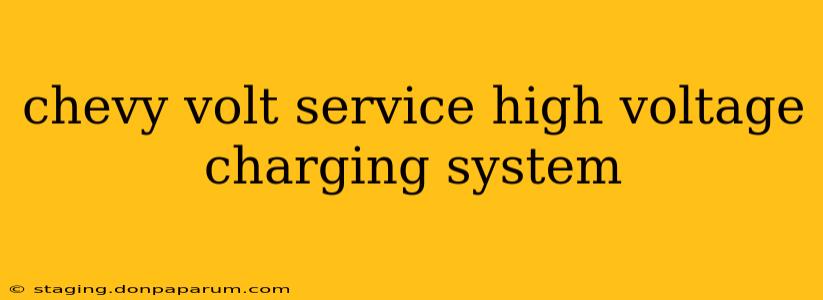The Chevrolet Volt, a pioneer in plug-in hybrid technology, boasts an impressive electric driving range. However, like any complex system, its high-voltage charging system can occasionally present problems. This comprehensive guide delves into common Chevy Volt high-voltage charging system service issues, troubleshooting steps, and preventative measures to keep your Volt running smoothly.
Understanding the Chevy Volt's High-Voltage System
Before tackling specific problems, it's crucial to understand the Volt's high-voltage architecture. This system comprises several key components:
- Onboard Charger: This unit converts household AC power to the high-voltage DC power needed to charge the battery.
- High-Voltage Battery Pack: This stores the electrical energy used to power the electric motor.
- High-Voltage Wiring: A network of specialized wiring carries the high-voltage electricity throughout the vehicle.
- Battery Management System (BMS): This sophisticated system monitors and controls the battery's charging and discharging processes.
- Charging Port: The point of connection for the charging cable.
Common Chevy Volt High-Voltage Charging System Problems
Several issues can arise within the high-voltage charging system, often manifesting in the following ways:
1. Charging System Malfunctions:
- Slow or No Charging: This could indicate a problem with the onboard charger, charging cable, charging port, or a fault within the high-voltage battery system itself. A "check charging system" warning light might illuminate on the dashboard.
- Intermittent Charging: The charging process might start and then stop unexpectedly. This often points to a loose connection or a failing component within the charging circuit.
- Overheating: Excessive heat generated during charging could indicate a malfunctioning onboard charger or a problem with the battery cooling system. This is a serious issue and requires immediate attention.
2. Error Codes and Warning Lights:
The Volt's onboard diagnostics system will often display specific error codes related to the high-voltage charging system. These codes are essential for pinpointing the source of the problem. Always consult your owner's manual or a certified Chevrolet technician to interpret these codes.
3. Battery Issues:
While not directly related to the charging system, problems with the high-voltage battery pack itself can affect the charging process. These include:
- Reduced Battery Capacity: Over time, the battery's capacity may degrade, resulting in shorter driving ranges and longer charging times.
- Cell Imbalance: Uneven charging or discharging of individual battery cells can lead to reduced performance and potential damage.
Troubleshooting and Solutions
Diagnosing and resolving high-voltage charging system issues requires expertise. Attempting repairs yourself is extremely dangerous due to the high voltage involved. Always contact a certified Chevrolet technician or a qualified automotive electrician for any repairs.
However, some basic troubleshooting steps can help identify the problem:
- Inspect the Charging Cable and Port: Check for any visible damage to the charging cable, charging port, and surrounding wiring. Ensure the cable is securely connected.
- Check the Power Source: Confirm that the power outlet is functioning correctly and providing the appropriate voltage.
- Monitor the Volt's Display: Pay close attention to any error messages displayed on the vehicle's instrument panel.
Preventative Maintenance
Regular maintenance can help prevent high-voltage charging system problems:
- Follow the Recommended Service Schedule: Adhere to the maintenance schedule outlined in your owner's manual.
- Use a Proper Charging Cable: Always use the charging cable provided by Chevrolet or a certified equivalent.
- Avoid Extreme Temperatures: Charging the Volt in extremely hot or cold temperatures can stress the battery and other components.
Disclaimer: This information is for general knowledge and guidance only. The complexities of high-voltage systems necessitate professional service. Always consult a qualified technician for diagnosis and repair of any charging system issues. Improper handling of high-voltage components can result in serious injury or death.

